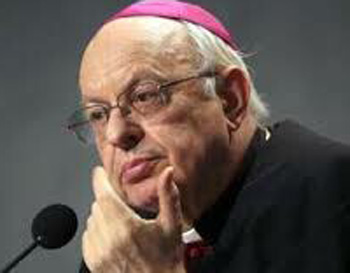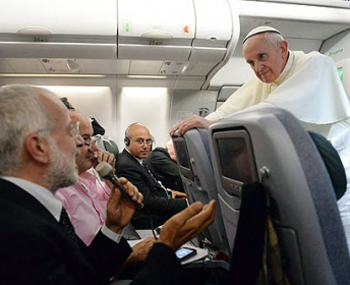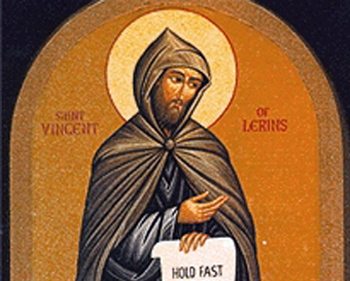Faith under Attack
 |
 |
 |
 |
 |
 |
 |
‘New Approach’ Announced on
Communion for Remarried Divorcees
Here is one early response to the Vatican questionnaire on marriage, a survey sent to seek the opinions of “the people in the pews” on 39 questions on family issues.
Archbishop Lorenzo Baldisseri, Secretary General of the Synod of Bishops, which will meet in 2014 and 2015 to discuss the family, has already announced the question is open on Communion for remarried divorcees.
the
In an interview published in The Vatican Insider, Baldisseri announced, “The Church should take a new approach towards the question of Communion for remarried divorcees.” The very fact that it was included in the Questionnaire, he continues further on, is evidence that the “issue will be looked at and discussed without any taboos. Otherwise it would not have been mentioned.”
Exactly what are these “taboos”? Obviously, it is the past teaching of the Church that forbids remarried divorcees to receive the Blessed Sacrament.
Baldisseri explains his position by referring to Pope Francis’ words in the recently released Apostolic Exhortation Evangelii gaudium, which pretends that the Eucharist “is not a prize for the perfect but a powerful medicine and nourishment for the weak.”
The Prelate interprets Francis' position like this: “We should pay attention to the phrase that follows immediately after this: ‘These convictions have pastoral consequences that we are called to consider with prudence and boldness.’
“The Pope presents these two elements together" – Baldisseri continues – "This means he wants these issues to be examined with prudence and, therefore, with attention to the Church’s doctrine. But he also wants them to be examined with boldness, which for me means ‘without fear,’ taking individual circumstances into account.”
When asked outright whether Church teaching will change, the “fearless” Archbishop seems to forget that the dogmatic Magisterium of the Church is unchangeable. Instead, he raises the hypothesis of change as if it is a normal process in the Church:
“The Magisterium is not rigid; it accompanies the doctrine of the Catholic Church. It is subject to continuous study and applied according to each case. The Church needs to apply Church doctrine taking the circumstances of each specific case into account. This approach does not mean making general conclusions and rules for everyone. We need to consider each case separately. Then we can develop a new way of looking at the doctrine. At the end of the day, even in the case of marriage annulments, we deal with each case separately. This is what pastoral care is all about; it is not a set framework.”
The Archbishop also suggested that the Church might have something to learn from the Greek Schismatics on this matter. Their practice of blessing second marriages in certain cases “can help illuminate the way,” he suggests.
Again, he explains his position by referring to a response of Francis on his return flight from Rio, when the Pope imagined that the Church needed to show more mercy. Then he stated that the “issue of giving Communion to persons in a second union” needed to be looked at “within the larger context of the entire pastoral care of marriage.” He pointed to “the Orthodox who have a different practice” of okonomia, which is “to give a second chance.”
Baldisseri also explained how the two-phase Synod – one meeting in 2014 and another in 2015 – is a “new approach that responds to the Pope’s new way of doing things and responds in some ways to the dynamics of the Second Vatican Council,” which called for more input from the Bishops and the local Churches. It is, he suggests, a means of setting up “a dynamic and permanent synod” that the Pope can consult on aspects of Church government.
Conflict with past teaching
This “new approach” of changing the doctrine about the Eucharist to favor remarried divorcees conflicts with Holy Scripture and Holy Mother Church’s past teaching through about 20 centuries, forbidding any substantive alteration of the Dogmas of Faith by anyone whosoever.
In Scriptures:
Given the clear teaching presented, we can affirm without a shadow of doubt that Archbishop Baldisseri is completely mistaken when he affirms that the Catholic doctrine about the Eucharist can be changed in order to accommodate divorced and remarried Catholics.
If he persists in defending this doctrine, according to the words of St. Thomas Aquinas, he will be building a different Church that has nothing to do with the Catholic Church.

Archbishop Lorenzo Baldisseri, Secretary General of the Synod of Bishops, which will meet in 2014 and 2015 to discuss the family, has already announced the question is open on Communion for remarried divorcees.

Baldiserri: The Pope backs Communion for divorced and remarried persons
Exactly what are these “taboos”? Obviously, it is the past teaching of the Church that forbids remarried divorcees to receive the Blessed Sacrament.
Baldisseri explains his position by referring to Pope Francis’ words in the recently released Apostolic Exhortation Evangelii gaudium, which pretends that the Eucharist “is not a prize for the perfect but a powerful medicine and nourishment for the weak.”
The Prelate interprets Francis' position like this: “We should pay attention to the phrase that follows immediately after this: ‘These convictions have pastoral consequences that we are called to consider with prudence and boldness.’
“The Pope presents these two elements together" – Baldisseri continues – "This means he wants these issues to be examined with prudence and, therefore, with attention to the Church’s doctrine. But he also wants them to be examined with boldness, which for me means ‘without fear,’ taking individual circumstances into account.”
When asked outright whether Church teaching will change, the “fearless” Archbishop seems to forget that the dogmatic Magisterium of the Church is unchangeable. Instead, he raises the hypothesis of change as if it is a normal process in the Church:

On his flight from Rio to Rome the Pope hinted at a change on Communion for the divorced and remarried
The Archbishop also suggested that the Church might have something to learn from the Greek Schismatics on this matter. Their practice of blessing second marriages in certain cases “can help illuminate the way,” he suggests.
Again, he explains his position by referring to a response of Francis on his return flight from Rio, when the Pope imagined that the Church needed to show more mercy. Then he stated that the “issue of giving Communion to persons in a second union” needed to be looked at “within the larger context of the entire pastoral care of marriage.” He pointed to “the Orthodox who have a different practice” of okonomia, which is “to give a second chance.”
Baldisseri also explained how the two-phase Synod – one meeting in 2014 and another in 2015 – is a “new approach that responds to the Pope’s new way of doing things and responds in some ways to the dynamics of the Second Vatican Council,” which called for more input from the Bishops and the local Churches. It is, he suggests, a means of setting up “a dynamic and permanent synod” that the Pope can consult on aspects of Church government.
Conflict with past teaching
This “new approach” of changing the doctrine about the Eucharist to favor remarried divorcees conflicts with Holy Scripture and Holy Mother Church’s past teaching through about 20 centuries, forbidding any substantive alteration of the Dogmas of Faith by anyone whosoever.
In Scriptures:
- Proverbs warns us: “Add nothing to His words, lest you be reproved and found a liar (30:6).
- And St Paul speaks sternly to the Galatians: “But though we, or an angel from heaven, preach a gospel to you besides that which we have preached to you, let him be anathema (1:8).

St. Leo the Great: 'The Faith shall never vary in any age'
- St. Leo the Great (400-461): "The Faith shall never vary in any age, for one is the Faith which justifies the Just of all ages. It is unlawful to differ even by a single word from apostolic doctrine." (Magno Munere, Epistle 82 to Emperor Marcian, PL 54; FOC pp.113, 356; Sermon 63, PL 54:353, SS vol. 2, p. 150)
- Gregory XVI (1831-1846): "Let nothing of the truths that have been defined be lessened, nothing altered, nothing added; but let them be preserved intact in word and in meaning." (Mirari Vos)
- St. Pius X (1903-1914): "I sincerely hold that the doctrine of faith was handed down to us from the Apostles through the orthodox Fathers in exactly the same meaning and always in the same purport. Therefore, I entirely reject the heretical misrepresentation that dogmas evolve and change from one meaning to another different from the one which the Church held previously.” (Oath Against Modernism)
- Pius XII (1939-1958): "The Church has the duty to proclaim the Faith without any whittling-down, just as Christ revealed it, and no consideration of time or circumstance can lessen the strictness of this obligation." (Papal Teachings on the Church, selected and arranged by the Benedictine monks of Solesmes, Boston: St. Paul Editions, 1961)
- Vatican Council I (1870): "Hence, also, that understanding of its Sacred Dogmas must be perpetually retained, which Holy Mother Church has once declared; and there must never be a recession from that meaning under the specious name of a deeper understanding.” (Session 3, Chapter 2 on Revelation)
- St. Athanasius (297-373): “God's Word is one and the same and endures forever unchanged, always the same.” (On the Incarnation, PG 26:983)
- St. Cyril of Alexandria (376-444): "For it is not allowable for anyone to change, even one word nor allow one syllable to be passed over, mindful of the saying: 'Pass not beyond the ancient bounds which thy Fathers have set.' (Prov 22:28)." ( Epistle 55, PG 77:292)
- St. Vincent of Lerins (5th century): “All novelty in the Faith is a sure mark of heresy. St. Paul cried out aloud, again and again, to all men, to all times, and to all places that, if anyone announces a new dogma, let him be anathematized!”, (Commonitorium, FOC p.106-107 ff)
- St. Thomas Aquinas (1225-1274): "Our Faith is identical with that of the Ancients. Deny this, and you dissolve the Unity of the Church. We must hold this for certain: that the Faith of the people of the present day is one with the Faith of the people of past centuries. Were this not true, then we would be in a different church than they and, literally, the Church would not be One." (On the Truth of the Catholic Faith, Q. 14, art. 12, Garden City, NY: Doubleday, 1955)

St Vincent: 'The Faith shall never vary in any age'
Given the clear teaching presented, we can affirm without a shadow of doubt that Archbishop Baldisseri is completely mistaken when he affirms that the Catholic doctrine about the Eucharist can be changed in order to accommodate divorced and remarried Catholics.
If he persists in defending this doctrine, according to the words of St. Thomas Aquinas, he will be building a different Church that has nothing to do with the Catholic Church.

Posted December 9, 2013
______________________
______________________





